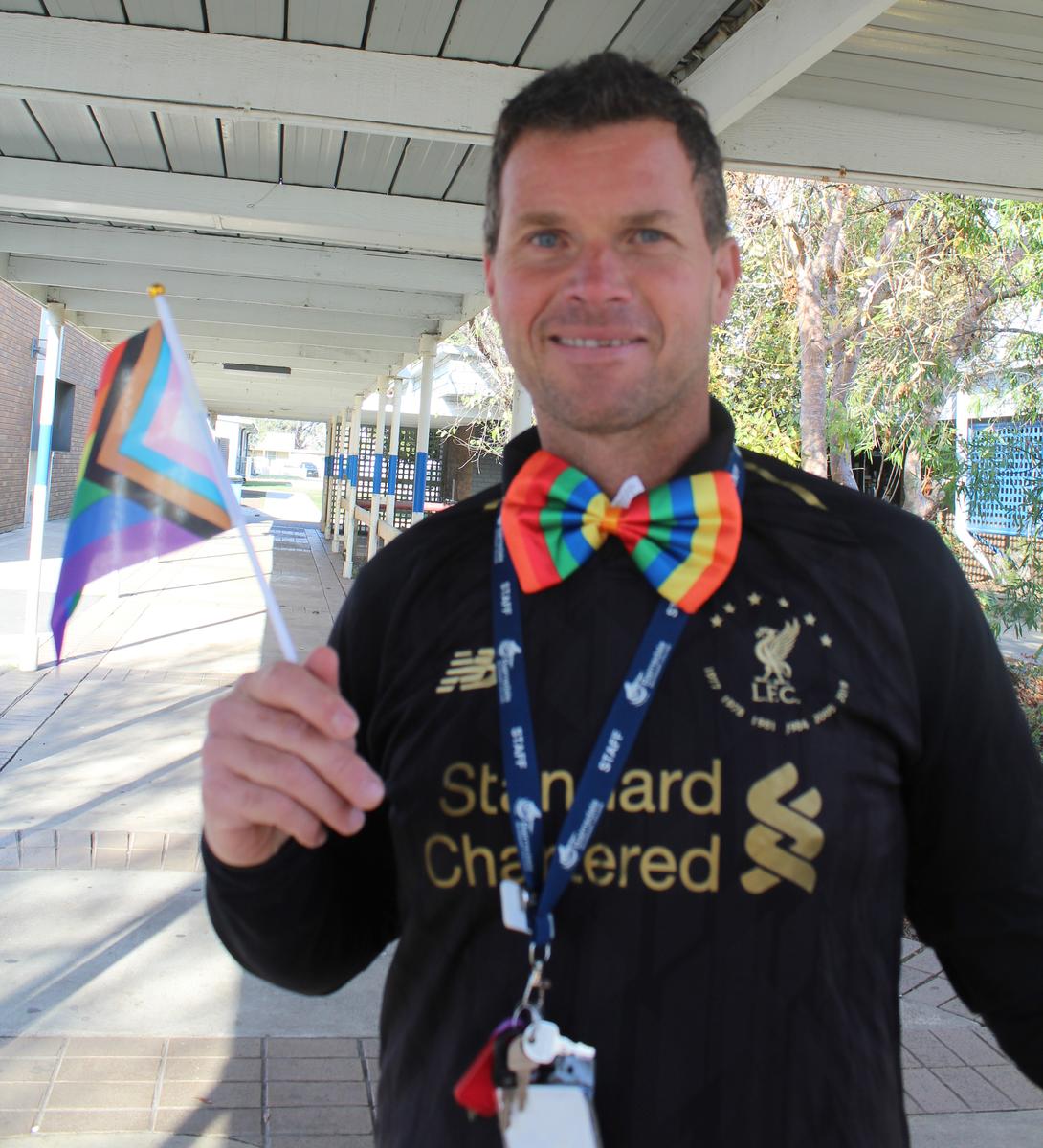Wellbeing

IDAHOBIT DAY 2024
On Friday 17th May, The College once again observed IDAHOBIT Day (International Day Against Homophobia, Biphobia, Interphobia and Transphobia). Events such as this are needed to help educate and raise awareness for the work still needed to combat discrimination. Celebrated annually, IDAHOBIT marks historic movements for the LGBTQIA+ community - the date itself honouring the date of when homosexuality was removed from the Classification of Diseases by the World Health Organisation.
The day began at the flag poles, where, joined by several members of the East Gippsland Shire, BSC College Captains, staff and students, pride flags were raised to in support of the LGBTQIA+ community and allies. East Gippsland Shire Youth Ambassador, Juliette Hart, (who is also a BSC student), delivered a memorable and touching speech to all those who attended.
During Break 1, and despite the cold weather, students welcomed the free Zooper Doopers on offer from the Wellbeing team. Following on and supported by Headspace, a short Webex was held in Session 4, which was joined by approximately19 classes .. a fantastic effort! At the commencement of Break 2, students from the LGBTQIA+ community were invited to join in activities and connect with external visitors from Headspace and the Bairnsdale Police.
We thank all of our guests for their attendance on the day, and also for their continued support for IDAHOBIT Day. A shout out also to staff who supported the event in one way or another. BSC strives to support all students guided by our core values of Respect, Responsibility and Resilience, and without doubt, our observance of IDAHOBIT is a wonderful opportunity for us to celebrate respect for all and our rich diversity of community here at The College.
Whether you are part of the LGBTQIA+ community, an ally, or simply someone who is wanting to learn and grow, the message is this … be bold, be fun, be yourself, but most importantly, be kind … always.
MENTAL HEALTH IN TEENS
What is pre-teen and teenage mental health?
Mental health is a way of describing psychological, social and emotional wellbeing. Your child needs good mental health to develop well, build strong relationships, adapt to change and deal with life’s challenges. Pre-teens and teenagers who have good mental health often:
• feel happier and more positive about themselves and enjoy life
• bounce back from upsets and disappointments
• have healthier relationships with family and friends• do physical activity and eat a healthy diet
• get involved in activities
• have a sense of achievement
• can relax and get a good night’s sleep
• feel like they belong to their communities.
Promoting good pre-teen and teenage mental health
Your love and support and a strong relationship with you can have a direct and positive influence on your child’s mental health. It can even reduce the chances of your child experiencing mental health problems. Here are ideas to promote your child’s mental health and wellbeing:
• Show love, affection and care for your child in ways that your child likes – for example your child might like hugs, smiles, pats on the back or quiet time together.
• Show that you’re interested in what’s happening in your child’s life. Praise your child’s efforts as well as their good points and achievements. Value your child’s ideas and opinions.
• Enjoy spending time together one on one with your child and also as a family.
• Encourage your child to talk about feelings with you. It’s important for your child to feel they don’t have to go through things on their own. If you work together on solving problems, it can stop things building up.
• Talk to trusted family members, friends, other parents or teachers if you have any concerns. If you feel you need more help, speak to your GP or another health professional.
Physical health is a big part of mental health. To help your child stay emotionally and physically healthy, encourage your child to do the following:
• Keep active. Physical fitness will help your child stay healthy, have more energy, feel v confident, manage stress and sleep well.
• Develop and maintain healthy eating habits.
• Get enough regular sleep. Pre-teens need 9-11 hours of sleep and teenagers need 8-10 hours of sleep a night. Quality sleep will help your child to manage a busy life, stress and responsibilities.
• Balance screen time and digital technology use with other activities that are good for development.
• Avoid alcohol and other drugs.
Signs pre-teens and teenagers might need help with mental health
It’s normal for children and teenagers to sometimes have low moods, poor motivation and trouble sleeping. These things aren’t always the signs of a mental health problem. But if you notice any of the following signs and the signs go on for more than a few weeks, it’s important to talk with your child. The next step is to get professional help. For children younger than 12 years, mental health warning signs might include:
• sadness a lot of the time
• a drop in school performance
• ongoing worries or fears
• aches and pains that don’t go away quickly
• loss of appetite or being picky with food
• problems fitting in at school or getting along with other children
• consistently aggressive, threatening, destructive, angry or violent behaviour
• sleep problems, including nightmares.
For children 12 years and older, watch out for your child:
• seeming down, feeling things are hopeless, being tearful or lacking motivation
• having trouble coping with everyday activities
• showing sudden changes in behaviour, often for no obvious reason
• having trouble eating or sleeping
• doing less well at school, or suddenly refusing to go to school, TAFE or work
• avoiding friends or social contact
• saying they have physical pain – for example, headache, stomach ache or backache
• being aggressive or antisocial – for example, missing school, getting into trouble with the police, fighting or stealing
• being very anxious about weight or physical appearance, losing weight or failing to gain weight as they grow.
Talking with pre-teens and teenagers about mental health
If you’re concerned about your child’s mental health, start by talking with your child. Talking with your child about how they’re feeling shows your child they’re not alone and that you care. Also, your child might need your help to get professional support. Here are ideas to encourage your child to talk with you about how they’re feeling:
• Say that even adults have problems they can’t sort out on their own. Point out that it’s easier to get help when you have support.
• Tell your child that it’s common for young people to feel worried, stressed or sad. Also
tell your child that opening up about personal thoughts and feelings can be scary.
• Tell your child that talking about a problem can often put things into perspective and make feelings clearer. Someone with more or different experience – like an adult – might be able to suggest options your child hasn’t thought of.
• Suggest other people your child could talk with if they don’t want to talk with you – for example, aunts or uncles, close family friends, a trusted sports coach or religious leader, an elder or your GP.
• Let your child know that talking with GPs or other health professionals is confidential. These professionals can’t tell anyone else, unless they’re worried about your child’s safety or someone else’s safety.
• Emphasise that your child isn’t alone. You’ll be there whenever your child is ready to talk.
Many pre-teens and teenagers won’t seek help themselves. It might take patience and encouragement for your child to feel comfortable seeking help. For example, if you raise your concerns with your child, they might refuse any help or say there’s nothing wrong. So you might need to say that you’re worried about them and you’ll be trying to get professional advice. If you make an appointment and your child won’t come, you might need to go on your own. If you’re not sure what to do, a GP or school counsellor is a good place to start.
Getting help for pre-teen and teenage mental health problems
Mental health problems are unlikely to get better on their own. And poor mental health or unmanaged mental health problems can affect your child’s wellbeing, physical health, schoolwork, relationships and development – social, physical, educational and vocational. This means it’s important to get professional help as soon as possible. Mental health problems do respond well to treatment. There are many professional support options, including:
• your GP
• school counsellors
• psychologists and counsellors
• social workers
• your local community health centre
• local or state or territory mental health services.
If you don’t know where to go, your GP will be able to guide you to the most appropriate services for your family. Poor mental health is no-one’s fault, and no-one is to blame.
Article credit# Raising Children Network










